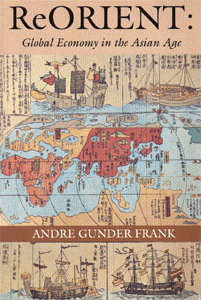|

The Underdevelopment of Development
by Andre Gunder Frank
February 1991 Revision
From a Personal Preface to the Author's Intentions
Economics and development economics and thinking have often been roughly divided into neo-classical (right), Keynesian (center), and Marxist (left). More colloquially and more usefully, we may distinguish Conservative, Reformist and Radical variants as in the recent Economic Development: The History of an Idea by H.W.Arndt 1987). Most authors probably regard themselves as too heterodox to be classified in any of these orthodox categories. Or they regard themselves as technician scientists, with no political color. If obliged to chose however, they probably would feel themselves least uncomfortable, like President Eisenhower, in the extreme middle of the road.
Moreover, the Methodenstreit has often been more severe within each of these categories than between them. Indeed, the first of these categories almost never, and the second only rarely, even take explicit account of the third. For instance a decade ago, Ben Higgins (1977: 117-8) observed with chagrin that when development economics was reviewed for the American Economic Association in 1971, one of its reviewers, Robert Solow, said "we neglected radical economics because it is negligible." Even now, The State of Development Economics: Progress and Perspectives, edited by Gustav Ranis and T. Paul Schultz (1988), out of eighteen chapters, devotes only one to dependence, written by Raul Prebisch. He makes little mention, and the other authors and chapters of the book none at all, of more radical or Marxist writings. Therefore, it may not be amiss to give this "neglected" study disproportionate and more personal attention here. However, the role of dependence writing in this development theory has recently received some more disinterested attention in several surveys, not of development economics but of development theory (Kay 1989, Hunt 1989, Hettne 1990, Larrain 1989). These and other surveys by people who were not there often speculate about who among those who were may have influenced or copied from whom. The autobiographical part of this essay and my references to other dependentistas and others along "my way" sets the record straight for my part in this history.
I therefore intend to undertake a political sociology of knowledge of "The Birth, Life and Death of Development Economics" (Seers 1979) or "The Rise and Decline of Development Economics" (Hirschman 1981) based on my own experience and perspective. Thus, I will pass review on the three varieties of development economics -- and autobiographically my own participation in all of them -- nearly as unequally as others. However, I will devote respective shares of emphasis and space to them in reverse order: the least to the conservative if not reactionary orthodox neo-classical variety preponderantly treated elsewhere; more to the right and left center Keynesian and other structural / reformist theory and policy; and most to the supposedly radical left (and mostly left out) dependency and "neo-Marxist" writings -- and their battles with the former especially in Latin America -- with which my name is mostly associated. Thus, I will also be able to show how I have had a foot or toe in each of these camps and several of their subdivisions.
Perhaps I can also clarify how on further "reflection and summing up," my multiple choice is now none of the above. Nor would I wish to find myself in any of these camps when H.W. Arndt (1987: 162-3) can write
Are we then to conclude that Adam Smith, Karl Marx, Gunnar Myrdal and Peter Bauer, all proponents of material progress, must be regarded as "Right" and A. G. Frank, Dudley Seers, the Ayatollah Khomeini, and the pope as "Left"? Or is it the other way around? Clearly there is something wrong, certainly in relation to economic development as a policy objective, with these labels.
An occasion and incentive (or excuse) to write a first version of this autobiographical survey of development theory arose when I received and accepted an invitation to contribute to a Festschrift in honor of my longtime friend Benjamin Higgins. The invitation was to write on the general theme of "equity and efficiency in economic development" but at the same time to write "a philosophical and contemplative essay... [which] need not be 'scientific'...[but instead] an occasion for reflection and summing up of a sort that 'learned journals' would not publish." Moreover, Higgins encouraged me to make my contribution autobiogaphical. Therefore, I set out to attend to all of these invitations for the following reasons and with the following intentions: 1) 30 years` friendship with Ben Higgins, 2) the receipt of more and more invitations (especially by anthropologists!) to lecture on something like "the rise and decline of dependence and Gunder Frank," 3) the already prior proposal to me by Albert Hirschman and Paul Streeten to write down an autobiographical account similar to their own, and Higgins' enthusiastic encouragement to do so here and now, 4) the encouragement by others to write a full blown autobiography, of which the present might become a draft chapter or two, 5) my desire to participate in the generalized agonizing reappraisal of experience with "development," 6) the urging by my wife Marta Fuentes with her help to work on, if not to work out, another concept of development, and last but not least 7) the call for responses to the increasingly generalized (consciousness of) crisis in development and development thinking.
All of these occasions, incentives, and purposes are reflected below. Therefore, this essay also includes some special references to Higgins' own writing on "equity and efficiency in economic development" and more contributions on the same than she is willing to acknowledge by Marta Fuentes, who asked to withdraw her name from authorship. In consequence, I now offer this essay as my own "contributuion" to the agonizing reappraisal of development in general.
From the Development Crisis Towards a Conceptual Introduction
The 1000 delegate 1988 congress of the International Society for Development in New Delhi was dominated by the theme of crisis. There was a sensation of total bankruptcy in development policy, thinking, theory and ideology, indeed of development tout court:
There emerged a strong and recurrent theme: We are at the end of an era and need to look beyond development to the survival strategies of the people if we want to understand what is really happening in the Third World (Development Forum, July-August 1988, p. 1).
Little wonder, as Latin Americans were lamenting their 1980s "lost decade of development." The per capita income and/or product is still their main official measure of development. Yet it had fallen by 10 to 15 percent back to a level of more than a decade before. In Africa, per capita national income had fallen over 25 percent to a level below that at the time of Independence, over two decades before. In both continents as elsewhere, these average declines of course hide their also worsening distribution, as "the poor pay more" of this decline than the rich. Thus, export led growth had failed in Latin America and self-reliance and "African Socialism" in Africa.
The Socialist countries first seemed to do well, but then they were also caught in the vice of crisis. Socialist national product and income had also fallen 25 percent in a four year period in Poland. Economic and political crisis went from bad to worse in Stalinist Rumania (lights out), worker-management Yugoslavia (threat of army intervention), not to mention liberated Vietnam (chaos and reprivatization). Even in reformist showcase Hungary, the average real wages in 1989 returned to the 1970 level. According to recent revelations, 25 percent of Hungarians live in poverty. In the Soviet Union, the Brezhnev period has been re-baptized as one of "stagnation." In reality many economic sectors (heavy industry) and social indices (infant mortality rates) have in fact deteriorated. As a result, the Revolution of 1989 occured in Eastern Europe since my writing of the above and most of the rest of this essay.
In the short run, not development, but crisis management has become the order of the day in much of the South and East (with significant partial exceptions in India, China and the East Asian NICs). In the West also, Reaganomic military Keynesianism was keeping the economy (temporarily?) afloat on borrowed time and money. No one anywhere left, right, or center, any longer has any practical solutions to offer. Neither advocates of neo-classical capitalist stabilization and adjustment in their neo-liberal guises, nor neo-structuralist advocates of reformist structural change, or even of radical socialist perestroika and glasnost can promise a credible solution to the crisis, much less for development. Even so, many of the former still, and some of the latter newly, prefer to masquerade their own ideological, theoretical and policy bankruptcy behind the newly fashonable neo-liberal phrases of promoting economic growth (=development?) by letting "the magic of the market" "get the prices right."
For the longer run, the environmental costs of past and present development styles have become increasingly ominous. The need for ecologically "Sustainable Development" (Redclift 1987) has become more urgent and obvious than when the Club of Rome referred to "The Limits of Growth" a decade and a half ago. Similarly, there is greater consciousness of how in the long run economic "development is bad for women" and largely at their expense.
Moreover as I will observe below, capitalist and socialist development orthodoxies turn out to share more in common on all these and other scores than the differences their right and left advocates have so long fought about. Both have come up against their respective or common dead end(s). Therefore, both orthodoxies (or their commonality) are / is also subject to refutation, rejection and replacement by an ever changing kaleidoscope of alternative ideological views and practical implementation of another development.
Furthermore, each of these alternatives is representative of and carried or promoted by one or more social movements. Some are reactionary against, and others progressive beyond, the postwar development orthodoxy/ies. Islamic and various indigenous revivalists and other ethnic groups combat Western (including Marxist socialist) modernization and promote a variety of cultures instead. Environmentalists try to reverse or at least to avoid further ecological degradation. Countless community and small-is-beautiful groups seek to protect their members' livelihood and identity. To do so, they pursue and organize another productive, distributional, political and cultural self-development through self-mobilization. Feminists and other women, who often express de facto feminist prose on the stage of social oppression, fight to change the gender structure of society. Thereby, they also improve the de facto conception and de jure definition of development. Their conceptions of equity, efficiency and economy in development are altogether different from those measured by growth rates of GNP.
From Equity to Efficiency in Economic Development
The invitation was to write for the Higgins Festschrift on the general theme of equity and efficiency in economic development. Whatever the purpose or audience, that is a good theme indeed. However, contrary to Higgins and his editor, it is not easy to do. For the general theme immediately raises the more particularist question of equity and efficiency, not to mention economic development, for whom?
Equity...for whom? What is it (or its measure) in an unequal world? Should unequals receive equal or (what?) unequal treatment, as the old but still unresolved adage goes? The policy of affirmative action acknowledges that is it only equitable to provide, even to assure, unequal treatment to unequals. Of course, this new inequality is intended to counteract or balance the original inequality and inequity a bit. But then even little affirmative action is in turn rejected (eg. recently by the U.S. Supreme Court) as too much, because it is also inequitable. And equal competitive market treatment of unequals, not to mention monopolistic treatment of those who have neither property not power, further increases both inequality and inequity.
Efficiency...for whom? That is a measure of the relation of means to (whose?) ends. What if the end is or even includes equity? Then neither market "efficiency," nor planning "efficiency," or perhaps not even participatory democracy are efficient. The market is not, because it accepts and enlarges inequity and inequality. Planning is not, because it gives the planners or their political bosses inequitable and unequal power to serve their own interests at the expense of others. Moreover, planning produces more red tape than economic welfare. Participatory democracy may also not be efficient, because it is often unworkable. And when it works, it institutionalizes endless discussion or dispute. What is more, what if we reject means-end-efficiency altogether as a male (imposed) and also otherwise unacceptable Aristotelian schema? For it may operate at women's and others' expense and counter to their spiritual or (other)intellectual dispositions.
Economic development...for whom? What if it turns out that development is bad for women (that's already half the population)? And what if it is bad for quite a few others as well, inasmuch as much development occurs at their expense and omits or even marginalizes them from its benefits? A forteriori for economicdevelopment. Perhaps social development would be a more equitable and better end. But then what is the measure of equity, let alone of efficiency?
For whom? Emperors, kings, and/or their prime ministers for centuries, Bismark and Stalin, and then postwar ideologies right,left and center all referred to development for the "country." De facto, of course, it was never for everybody in the country. Moreover, everybody claimed explicitly or implicitly that someone did or might have a development "policy" for the country. Frankly, I have long since and all along doubted the verity and even the plausibility of this last proposition, at least under capitalism. But now I also refer the reader to my comments on "socialist planning" above and below. Moreover, as I will argue below after retracing my tortuous road, it now also appears that if "development" has any operational sense at all, it is not in reference to a country or (often non) nation state. Instead, the only meaningful development is of the world economy and society at one level and for much smaller social groups or individuals at another level. For the latter, development policy is very different from that implied by development policy writers and planners. Efficiency may be individual or group means to their respective ends, but equity between individuals or groups is hardly considered. World development still seems to follow a macro historical course, which is largely beyond intentional human micro controls. Therefore policy (making) is hardly even relevant for world development at all.
In a word, dealing with equity and efficiency in economic development is really not so easy after all. Below I will show that since I was driven by my passion for justice and equity, I saw more difficulties than others in combining equity and efficiency under capitalism, already when it all began for me in the 1950s. But since then, experience and reflection have obliged me to make (shades of John Foster Dulles) agonizing reappraisals also of some "socialist" illusions about equity and efficiency in economic development. I shared them with many in the 1960s, agonized over them in the 1970s, and I had to leave them by the wayside of my long and not yet ending road in the 1980s. Alas moreover, I do not have the comfort of replacing my old illusions by the new ones about the "magic of the market," which are now so popular West, East, and South. I may now retrace some of the steps and major bends, as well as the changing scenery, along the way of development thinking and praxis for others and for me to indicate where I stand now. Who knows for how long.
The recipes for the establishment's main course development of development thinking are well known. So is their proof in the unsavory eating of the pudding. Both have recently been oft reviewed, as noted above. Even the rise and decline of the (supposed) alternative theories and policies of dependent underdevelopment have been widely reviewed. Therefore, I can here confine myself to doing the same once over lightly and devote more attention instead to how my own nuisance value flea bite participation in this unfolding story has changed my own perceptions. (...)
Continued in section development

|




